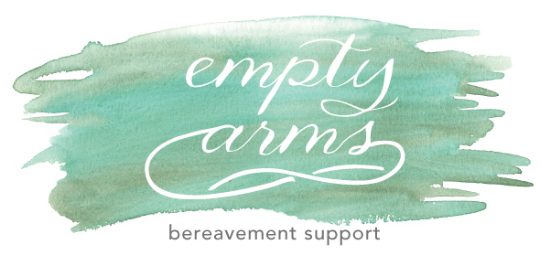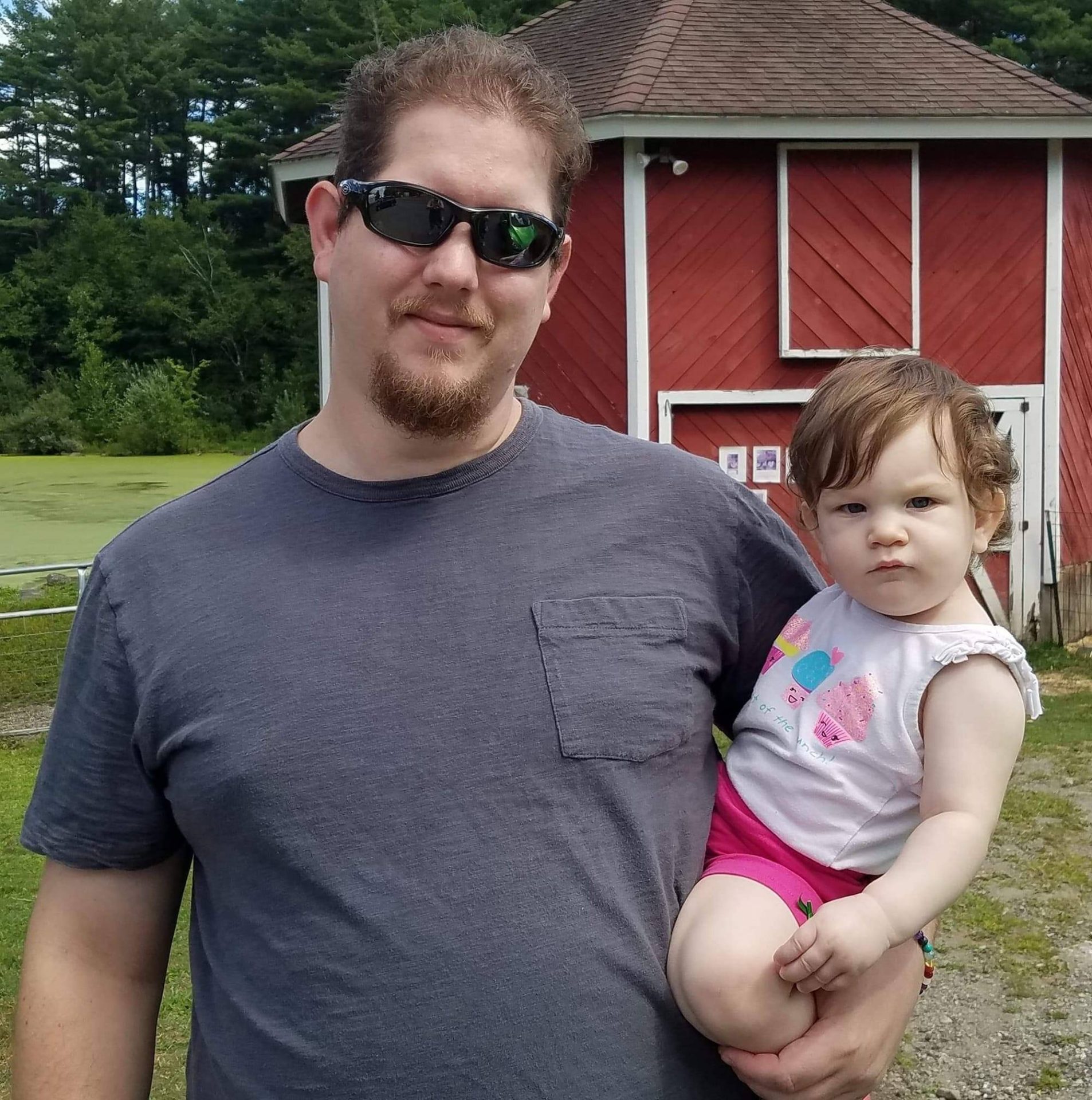When Robert Croteau enlisted in the Marine Corps in 2008 at the age of 19, he probably never imagined that twelve years later he would be sitting in a circle of emotionally raw men, some wiping away tears, helping to build a program for grieving fathers at Empty Arms. Yet that’s exactly where he is: in the midst of a social work program at Elms College, Robert is completing an internship with Empty Arms that focuses on building programs specifically for fathers. Robert’s story is one that involves several major life changes and some serious attention to the change he was able to make in the world. We at Empty Arms are so happy to have him as part of our team.
When he finished high school, Robert went right into the Marines, where he worked as an aviation supply specialist with one tour in Afghanistan. Shortly after coming home, in 2012, he met the woman who would soon become his wife, Melissa. Several years later they discovered they were expecting a baby, and they couldn’t have been happier. They planned a wedding and got married, excited for the life they would be building together.
Except that all did not go as planned. Midway through her pregnancy, Melissa went for a routine doctor’s appointment where it was determined that their son, Logan, had passed away. Robert remembers, “I had a new job as a dispatcher, and I had just come off a 16 hour shift. I almost didn’t go to the appointment– I was exhausted– but I really wanted to be part of everything so I made myself go. I am so grateful I did… “ When they got the news about Logan, Robert remembers not knowing what to do. “I picked up the phone and called my mom, who worked at the hospital. I couldn’t even get the words out. I just said, Mom, I need you, and she came.”
The next few days were emotional agony as Melissa was induced and delivered Logan. Robert recalls, “I did all the funeral arrangements, I felt like I had to as the male, as the father, but I also felt like I had to do it so my wife didn’t have to do it. It was still difficult for me but I felt like I would rather take that hit than have her take it”. Things became even more complicated when several days later, Melissa developed a blood clot in her leg and had to be rushed back to the hospital. It seemed their nightmare was going on and on.
As the couple struggled through the next few months, and into the next year, Robert describes the challenges of being a grieving father: “As the father in this society people don’t talk to you. They give you the space you want, they may check up on you, but there’s no in-depth talk about your baby or your loss. For example, we stayed at my parents house for a couple of weeks afterwards, but even when they came home from work it wasn’t like we talked about anything specific– they made us food and took care of us, but we didn’t talk about our feelings. I feel like the female counterpart, their friends ask about their emotions, they pry it out of them somehow, and I don’t think that happens with men.”
Certainly Robert is not alone in this observation. Many of the men we serve at Empty Arms describe the same isolation, of friends not knowing what to say or how to treat them in the wake of loss. Reactions can range from totally ignoring the loss, to saying hurtful things to the father that can be difficult to ignore or repair. Robert also shares that it was difficult for him to express how he was struggling. “I think probably from my experience in the Marines, – any physical or mental injury, you didn’t report those things, you didn’t want to do that. I didn’t want to acknowledge I was struggling– I wanted to show, I’m ok, I can deal with it.” Yet his heart was hurting.
While his wife, Melissa, attended Empty Arms meetings, Robert didn’t feel inclined to go with her. He shares, “Society doesn’t treat us the same- we’re expected to not have as many emotions and get over it faster. That’s from my own experience. The people I got the most acknowledgement from were the various women in my life– my female boss, my wife, my mother. My wife’s friends would ask “Is Robert OK?” but they never asked me”. The men in my life supported me in other ways — my father started a GoFund me so that we wouldn’t have to use our wedding money on the funeral, and my father in law helped to pay for the headstone.
Robert was by no means alone, yet it was hard for him to know who to talk to– or how.
Several years passed, during which Robert continued to work as a dispatcher and then changed jobs to work as a janitor in a school. Yet something was missing. Robert shares, “I wanted to feel good about the work that I do. I’ve always wanted to help people my entire life– my sister, who is seven years older, is a nurse. I knew I wanted to be like my sister and help people. I wasn’t interested in nursing, but I wanted to improve the quality of life for other people. At first I wasn’t quite sure how– and I wanted to wait until I knew what I wanted to do to use the GI Bill to go to college. But then, as I was working menial jobs after the loss, I thought– now is the time I’m going to do something with this: I realized that I wanted to help families and individuals after their loss. I didn’t have a lot of support for me, and it was a subject I am passionate about. My original thought was to be a psychologist, to help people work through grief, but when I talked to the school, they said, I think you’d be more interested in social work.”
It is as part of that social work program that Robert circled back to Empty Arms, where he has trained as an Empty Arms facilitator and has worked to develop a curriculum for his Father’s Support Group, which is halfway through its first session. Unlike most Empty Arms groups, which are drop in, this group is a closed group: meaning that a group of 8 men signed up for the group and committed to attending six sessions together. This known group of participants creates an extra layer of safety and allows participants to develop a shared understanding that carries over the sessions. Together with Carol, Robert has found the group to be incredibly powerful. “It’s doing so much for these dads. As weird as it seems– when they’re telling stories and getting things off their chests and they’re connecting with each other–it makes me happy. They’ve found that connection and they know that they’re not alone anymore. It makes me feel good that I have the strength to be the facilitator of that group. When they’re telling their stories, and they say something I can relate to I find myself wanting to smile– they’re getting it out and you know that it’s cathartic. This is really good work we’re doing right now.”
How right he is.
Creating this designated space for fathers feels very powerful. Says one father who’s involved with the group, “I’m honored to be sharing in this newly formed Father’s Group. While we’ve only met a handful of times to date, I really appreciate getting to connect with other men who have been in similar circumstances and are also navigating infant losses. Through our presence and participation in this group, we are there in support for ourselves and for one another. In contrast to more general support circles, this fathers group has an added dimension of being able to talk through our losses and shared experiences with other men – something that I’ve been finding incredibly valuable. I’m looking forward to the remaining sessions that we have scheduled. Connecting with others in similar shoes is healing for me and I’m hopeful that our discussions will be beneficial to other families, and particularly fathers suffering similar losses, in the future.”
As an organization and as part of a shared society we have always been aware that mens’ experiences are different, yet we’ve always served men successfully in our larger circles. It has been very impactful to see how mens’ sharing has changed when they are in a circle with just other men: it’s somehow deeper, and more honest. Empty Arms is so pleased to be offering this new group, and Robert’s story is emblematic of how our programs expand here at Empty Arms: community interest, combined with community need and willing participants creates new services. Robert shares how much he’s benefited from being part of the group as well: “Being a member in the group has felt very powerful. Four months ago when I attended my first Empty Arms meeting it made a huge impact on me and I immediately wondered if I should have done it sooner. It was such a welcoming space. I’m so grateful to be able to provide this for others, and to be involved in it myself.”

